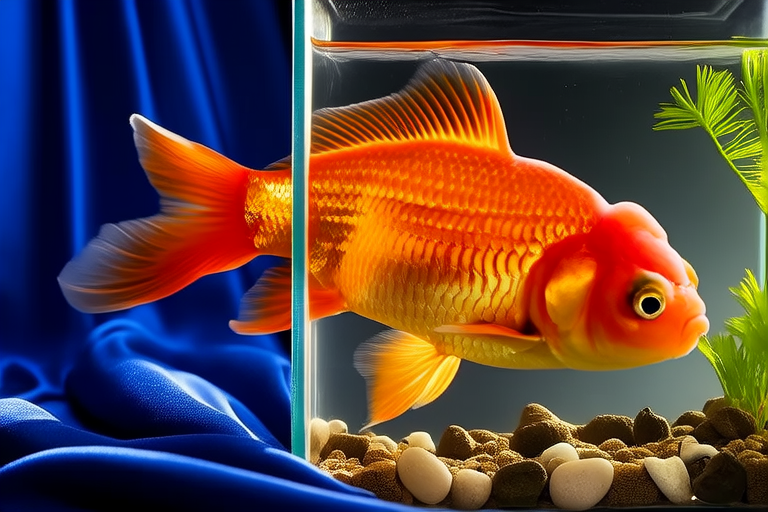Goldfish Lifespan Revealed: What You Need to Know for a Healthy Pet
Welcome to your ultimate guide on goldfish care! Goldfish are among the most popular pets worldwide due to their vibrant colors and relatively low maintenance requirements. However, many owners underestimate the complexity of ensuring a long and healthy life for these aquatic companions. In this comprehensive article, we’ll delve into the secrets of extending your goldfish’s lifespan, providing you with all the essential information you need to be the best possible owner.
Understanding the Average Goldfish Lifespan
Contrary to popular belief, goldfish can live much longer than just a few years. The average lifespan of a domesticated goldfish is around 10 to 15 years, but some have been known to reach up to 20 years or more. Factors such as genetics, environment, and care play significant roles in determining how long your goldfish will thrive.
Factors Affecting Longevity
Genetics
Just like humans, goldfish inherit traits from their parents that can influence their lifespan. Choosing a healthy parent for breeding is crucial in producing robust offspring. When purchasing a goldfish, it’s essential to select one from a reputable breeder who prioritizes genetic health.
Environment
The quality of water and living space directly impacts the health of your goldfish. Proper filtration systems, regular water changes, and maintaining optimal temperature and pH levels are vital for creating a healthy habitat. Additionally, overcrowding should be avoided, as it can lead to stress and disease.
Diet
A balanced diet rich in nutrients is essential for your goldfish’s overall health and longevity. Feeding them high-quality fish food specifically formulated for goldfish ensures they receive all necessary vitamins and minerals.
Essential Care Tips
Water Quality
Regularly testing and maintaining water parameters is crucial. Ammonia, nitrite, and nitrate levels should be monitored closely. Use a reliable water test kit and perform partial water changes weekly to keep these levels within safe ranges.
Feeding Habits
Feed your goldfish small portions twice daily. Overfeeding can lead to digestive problems and poor water quality. Avoid feeding them more than they can consume in two minutes.
Handling and Transportation
Minimize handling your goldfish, as it can cause stress. If transportation is necessary, always use appropriate containers and acclimate them slowly to new environments.
Common Health Issues
Despite our best efforts, goldfish may still encounter various health issues. Here are some common ones and how to address them:
Fungal Infections
Fungi often grow on weakened areas of the fish’s body, especially after injuries or parasitic infestations. Maintaining good water quality and treating affected areas with antifungal medications can help prevent and treat fungal infections.
Bacterial Infections
Bacteria can cause diseases like fin rot and dropsy. Ensuring clean water and using antibiotics under veterinary guidance can manage bacterial infections effectively.
Parasites
Parasites such as ich (Ichthyophthirius multifiliis) can be devastating if left untreated. Quarantine new additions to the tank and use appropriate treatments to combat parasites.
Proper Diet for Goldfish
A varied diet is key to keeping your goldfish healthy and happy. Feed them a mix of flakes, pellets, and occasional treats like blanched vegetables and frozen brine shrimp. Ensure a balance between protein and plant matter.
Suitable Tank Conditions
Tank Size
Adequate space is critical for goldfish. For every inch of fish, provide at least one gallon of water. Larger tanks offer more room for swimming and better water quality.
Heating and Filtration
Goldfish prefer cooler water temperatures between 68°F and 74°F (20°C to 23°C). While they don’t require heating, it’s beneficial during colder months. Efficient filtration helps maintain water clarity and reduces harmful substances.
Decorations and Plants
Incorporate natural elements like rocks, driftwood, and live plants to mimic their natural habitat. This provides hiding spots and stimulation for your goldfish.
Myths Debunked About Goldfish Care
Goldfish Can Live in Bowls
This myth is widely believed but false. Bowls lack adequate space and filtration, leading to poor water quality and shortened lifespans. Always opt for aquariums instead.
Goldfish Don’t Grow Beyond Their Bowl
While it’s true that goldfish may appear smaller in cramped conditions, they will eventually outgrow any confined space. Providing ample room allows them to reach their full potential size.
Goldfish Are Low-Maintenance Pets
Although goldfish are generally easy to care for, they still require consistent attention and effort. Regular cleaning, monitoring water quality, and feeding them properly are necessary to ensure their well-being.
Conclusion
By understanding the factors that affect goldfish longevity and implementing the care tips outlined in this guide, you can significantly enhance your pet’s quality of life. Remember, a healthy goldfish starts with a knowledgeable owner. Take pride in your role as a responsible caretaker and enjoy the rewarding experience of sharing your home with these delightful creatures.
